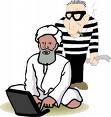| You are here Main Page >> Copyright and IPR |
|
Using Video and materials from the internet Section 34 (2) of the Copyright, Designs and Patents Act 1988 states: "The playing or showing of a sound recording, film or broadcast before such an audience at an educational establishment for the purposes of instruction is not a playing or showing of the work in public for the purposes of infringement of copyright." and Section 35 (1) "A recording of a broadcast, or a copy of such a recording, may be made by or on behalf of an educational establishment for the educational purposes of that establishment without thereby infringing the copyright in the broadcast, or in any work included in it, provided that it is accompanied by a sufficient acknowledgement of the broadcast and that the educational purposes are non-commercial." This is written in respect of film and broadcast medium and is the law that currently applies to the internet. However this does assume that the material that are being broadcast already have copyright clearance to appear in the place they appear. So, it is still beholden on the individual to given reasonable check to any materials they show or download from the internet and if there is doubt they should check the providers of the material and obtain written permission to use the materials. Below is my personal guide to using material from the internet in your classroom and in the preparation in schools. This is NOT A LEGAL STATEMENT and would be no defence in law. Stuff that I am using in my own classroom or to prepare resource just for my classroom. Ideally you will have a projector and an internet connection in your classroom so as much as possible you can prepare resources which will connect live to the internet to access resources such as video and audio [if these are streamed you have no choice]. If you are unable to do this you might be able to download these sources and then embed them in your own materials. Unless you have gained permission you should not save these onto the school server for pupils to access. This is the same for images and text from the internet unless the site gives you permission to do so, or you have contacted the site owner and asked for permission. If you are preparing presentations / worksheets / teaching materials or your pupils are preparing presentations, assessed work it is normally fine to save images, text into these documents but you should always reference work that is not yours. Stuff that I am preparing to share with my colleagues in the department. The same rules as above apply but as you are now going to be distributing work should you make sure that you have not credited any work as your own that is not. You should also seek permission from web sites from which you have taken material and should credit the source from which you have taken material. Stuff that I am storing on the school server [internal] or website / VLE [external] If you are intending to save resources into the school server (e.g. image or sound sets) for the students to have access to then you must have permission from the authors and have sourced this materials. Make sure that you have explained to the creator of the material how this is going to be used and if it is restricted access [just the staff / students in your school] or open access [anyone can get this across the internet]. Stuff I am distributing wider If you are intending to share your materials via a file sharing service [e.g. RE Stuff or the Teacher Resource Exchange] then either the materials must all be your original work, or you must ensure you have credited and gained permission from the original creators of the materials. Stuff I am producing for sale If you are intending to sell the materials must all be your original work, or you must ensure you have credited and gained permission from the original creators of the materials. There will normally be a charge from people if you are going to use their work commercially as opposed to for not-for-profit educational purposes. Check any copyright statement on a website carefully before using the material in this way. Referencing materials from the internet The usual way to reference a piece of text or an image from the web is to use the Harvard referencing so: Author
[if known], web address, date accessed for images you can reference using: Image from http://www.mcbaincamera.com; Nov 17th 2006 |

 This
whole question is a bit of minefield as information that is held on
the web may be produced in one country, by a person who lives in another,
held on a web server in a third country, distributed via forth, fifth
and sixth countries and then accessed by you in a seventh. You see
the problem!
This
whole question is a bit of minefield as information that is held on
the web may be produced in one country, by a person who lives in another,
held on a web server in a third country, distributed via forth, fifth
and sixth countries and then accessed by you in a seventh. You see
the problem!